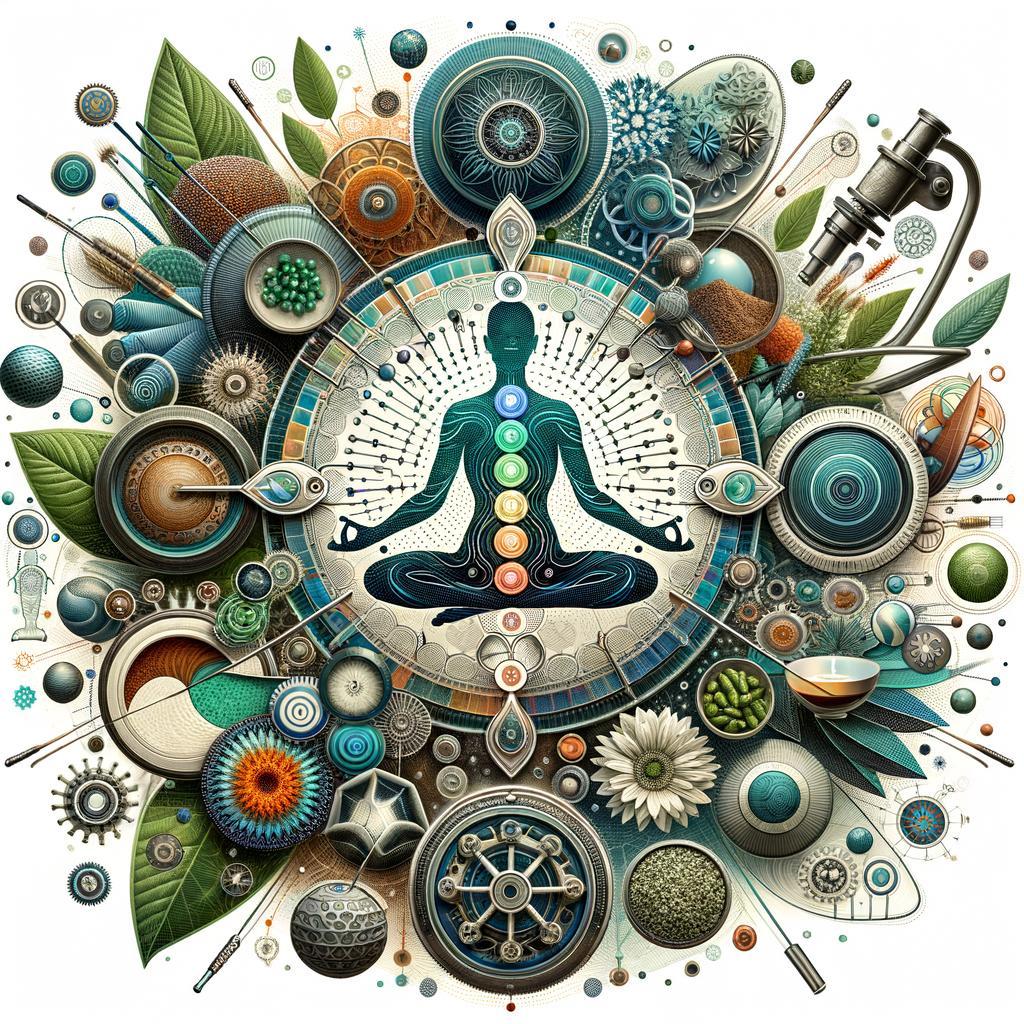“Holistic Approaches to Stress Relief and Mental Clarity”
In a world that often feels like a relentless whirlwind, where the demands of daily life can leave us feeling overwhelmed and frayed, the quest for peace of mind has become a universal pursuit. Stress, a silent but powerful force, has woven itself into the fabric of our existence, often clouding our clarity and dampening our spirits. Yet, amid this chaotic landscape, a growing movement is emerging—one that champions the idea of holistic approaches to stress relief and mental clarity. This article will explore the intricate tapestry of techniques and traditions that aim not only to soothe the mind but also to nourish the body and spirit. From mindfulness practices that ground us in the present moment to the therapeutic powers of nature and creative expression, we will delve into the diverse avenues available for cultivating a serene and focused mental state. Join us on this journey of discovery, and uncover how embracing a holistic approach can transform stress from a heavy burden into a stepping stone toward resilience and clarity.
Exploring the Mind-Body Connection for Enhanced Stress Resilience
Understanding the intricate relationship between our mind and body can unlock profound pathways to resilience against stress. This connection is often overlooked, yet it plays a crucial role in our overall well-being. Engaging in mindfulness practices such as meditation and yoga can have transformative effects, enhancing our ability to cope with stress by promoting relaxation and emotional stability. These practices encourage us to tune into our bodies, fostering awareness of physical sensations and emotional responses, which can lead to more effective stress management techniques.
To further explore this relationship, consider integrating holistic approaches into your daily routine. You might find the following methods particularly beneficial:
- Breathwork: Harnessing the power of breath can significantly lower stress levels.
- Nature Therapy: Spending time in natural environments can rejuvenate both mental and physical health.
- Nutrition: A balanced diet rich in antioxidants and omega-3 fatty acids can enhance brain function and reduce anxiety.
- Physical Activity: Regular exercise not only strengthens the body but also elevates mood and reduces stress hormones.
Implementing these practices can create a synergistic effect, enhancing mental clarity while building resilience against stress. By fostering wellness through the mind-body connection, individuals can cultivate a greater sense of peace, leading to a more fulfilling life.
Natural Pathways to Mental Clarity: Dietary and Herbal Support
Incorporating specific dietary choices can significantly enhance mental clarity and overall well-being. Foods rich in omega-3 fatty acids, such as salmon, sardines, and walnuts, are known for their brain-boosting properties. Additionally, antioxidants found in berries and dark chocolate combat oxidative stress, potentially sharpening cognitive function. Consider including the following in your daily meals:
- Leafy Greens: Spinach and kale for improved nutrient absorption.
- Whole Grains: Quinoa and brown rice stabilize energy levels.
- Hydration: Adequate water intake is crucial for optimal brain function.
In tandem with a nourishing diet, herbal remedies offer natural support for mental clarity. Adaptogens like rhodiola rosea and ashwagandha help the body adapt to stress, enhancing mental resilience. Other beneficial herbs include ginkgo biloba, known for boosting circulation and cognitive speed, and peppermint, which can invigorate the mind. To explore these options further, consider a simple comparison of these herbs and their benefits:
| Herb | Benefits |
|---|---|
| Rhodiola Rosea | Reduces fatigue and enhances focus |
| Ashwagandha | Promotes relaxation and stress management |
| Ginkgo Biloba | Improves memory and cognitive function |
| Peppermint | Stimulates mental alertness and reduces fatigue |
The Power of Mindfulness Practices in Cultivating Inner Peace
In our fast-paced world, the practice of mindfulness serves as a powerful anchor, allowing individuals to cultivate a serene inner landscape amidst the chaos. By engaging in *mindfulness meditation*, breathing exercises, and body awareness techniques, one can train the mind to focus on the present moment. This heightened awareness paves the way for emotional resilience, enabling individuals to navigate stress without becoming overwhelmed. Key practices include:
- Breath Awareness: Focusing on the rhythm of the breath can ground us, providing immediate relief from anxiety.
- Body Scan: This technique helps in tuning into bodily sensations, enabling the release of tension held within.
- Mindful Walking: Integrating movement into mindfulness reinforces the connection between the body and mind.
Moreover, by creating a dedicated space for mindfulness practices, one can enhance their effectiveness. Consider setting an engaging routine, integrating elements that resonate with your personal preferences. A simple yet impactful template could look like the following:
| Time | Practice | Description |
|---|---|---|
| Morning | Breath Awareness | Start your day with 10 minutes of focused breathing. |
| Midday | Body Scan | Take a break to check in with your body, releasing tension. |
| Evening | Mindful Walking | End your day with a reflective walk, allowing thoughts to settle. |
As these practices weave themselves into daily life, they can significantly enhance mental clarity and emotional stability, paving the way for a more harmonious existence. By nurturing the mind through mindfulness, individuals can experience profound shifts, transforming how they relate to stress and their internal narrative.
Movement as Medicine: Integrating Physical Activity for Stress Relief
Incorporating physical activity into your daily routine can serve as a powerful antidote to stress. The act of moving your body not only releases endorphins—commonly known as the “feel-good” hormones—but also facilitates a deeper connection between mind and body. Engaging in various forms of exercise, whether it’s a brisk walk in nature, yoga sessions, or high-intensity interval training, encourages mindfulness and presents an opportunity to clear the cluttered mind. Here are some effective ways to cultivate a consistent movement practice:
- Mindful Walking: Take a moment each day to immerse yourself in the environment while you walk.
- Yoga and Stretching: Incorporate deep-breathing exercises that enhance relaxation and body awareness.
- Dance: Let loose to your favorite music and enjoy the exhilarating release of stress.
To maximize the benefits, consider setting up a weekly movement schedule that aligns with your personal preferences. By establishing regular physical activity, you’re not only laying a foundation for stress relief but also paving the way for enhanced mental clarity. Below is a simple framework to help you visualize your week:
| Day | Activity | Duration |
|---|---|---|
| Monday | Yoga | 30 minutes |
| Wednesday | Jogging | 45 minutes |
| Friday | Dancing | 1 hour |
| Saturday | Nature Hike | 2 hours |
In Retrospect
In a world often driven by the relentless pace of modern life, embracing holistic approaches to stress relief and mental clarity can be a transformative journey. By weaving together the threads of mindfulness, nutrition, body movement, and nature, we create a rich tapestry of well-being that nurtures both the mind and body. As you explore these practices, remember that the path to tranquility is uniquely yours, filled with opportunities for discovery and growth. The integration of these holistic techniques can illuminate the shadows of stress, inviting clarity and peace into your daily existence. So take a deep breath, embrace the present moment, and embark on this journey toward a more balanced and harmonious life. In doing so, you’ll not only cultivate resilience but also unlock the inner calm that lies within, ready to flourish amidst the chaos of everyday life.













Post Comment